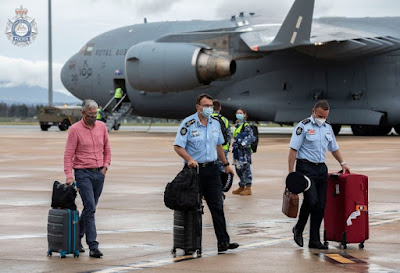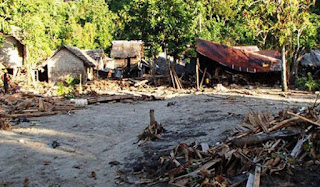FROM MARKET TO OWNING A CONFERENCE CENTER
 |
| Christina in part of her plantation |
THE warmth with which Christina Tony greets you and her mounting excitement as she
describes a typical day in her 20 years of being a farmer vendor in Honiara,
the capital of Solomon Islands, belies the backbreaking work that’s the
foundation of her entrepreneurial trajectory.
The 44-year old was married
by her 15th birthday and realised very quickly that she needed an
income to support her family. Christina chose to start at the market and has
never looked back: today she owns a conference centre in her village of
Arietakiki.
“I had a dream that I must
have a conference centre when we were at your (Markets for Change) training.
When we have government departments or business people come here, they don’t
have to sit under a tree – they hire my conference centre,” Christina said.
 |
| Christina inside her conference center |
Christina who hosted more
than 100 groups in 2018 was a 2016 beneficiary of financial literacy and
agriculture training provided by the Markets for Change Project which led to
her business diversification and better agriculture practices. She does not use
the slash and burn method to clear plantation land for example, and she has
begun using compost rather than fertilisers.
A typical day begins with
household chores before some planting; Christina plants pineapple, bean, tomato
and cabbage for the market. She prefers to harvest vegetables destined for the
market early in the morning which she will carry to the road, a 20-minute walk
which includes crossing a “bridge” of coconut tree trunks maintained by her
family. Christina takes her cargo to the
city in trucks which will cost her SB$100 (US$12.35).
UN Women’s
Markets for Change (M4C) Project is a multi-country multi-stakeholder
partnership principally funded by the Australian Government with recent support
from the Government of Canada; UNDP is a project partner. The Markets for Change Project has presence in three Pacific countries –
Fiji, Solomon Island and Vanuatu.
 |
| Christina in part of her plantation |
“Since I started going through the training, I
know how to manage what I’ve earned. Before that, I spent without planning. Now
we eat crops from the garden and only buy rice if we really need to. I now do
record-keeping record,” Christina said. “What is left is what I save for my
personal savings and also for medical bills or any other unforeseen problems
that might arise at any time.”
Christina continues to sell crops at the
market. She can earn as little as SB$100 or as much as SB$2000 (US$347.07) on
any of the days she is at the market. Christina paid
SI$17,800.00 (US$3088.92) for her centre from her savings, choosing not to take
a loan. For her family, Christina now has a savings
scheme where each person “banks” their savings which are recorded, and it is
then distributed at the end of the year – if they wish to.
Christina enjoys being part of the Honiara
Central Market Vendors Association because of how much it has enriched her;
learning and witnessing practices by her counterparts that she could adapt to
improve her own venture makes her happy. Christina shares her knowledge with
other women in Arietakiki.
“My long-term goal is to have a homestay but
for now, I am trying to organise a sewing training in my centre, so more women
can learn something that can bring in some money for their families,” she said.
“I have not gone
through any education, but I have tried my very best to have what is best for
me and my family. Sometimes I struggle alone but I do my best to do what I am
thinking of doing.”
 |
| Christina with her mum and niece who teaches in the local school |
The M4C Project supports financial
literacy amongst vendors and market vendor associations, and is supporting
greater access to financial services, improved agricultural skills and in some
cases, more secure agricultural skills. M4C works to ensure that marketplaces
in rural and urban areas of Fiji, Solomon Islands and Vanuatu are safe,
inclusive and non-discriminatory.
Christina attended the International Rural
Women’s Day in Auki in 2017 as a member of the association; it was also her
first visit to Malaita Province. Being a member of the association, she said
has opened the door for her and her family to many positive changes including
an increasing circle of like-minded entrepreneurial women.
 |
| Christina with her dad outside his sleeping house |
While her
biggest challenge as a business operator for now is transportation, Christina
does not deny that there are improvements needed at the market itself. She
would like to see more space created for example that would allow farmers to
sell their produce as casual vendors. Waste management and market cleanliness
is another aspect of the market that she would like to see improved.
But for now,
she celebrates life: as a business woman who now owns a conference centre and
is working herself slowly towards a homestay. “I really like changes. Changes
which I want to show to women within the rural areas. What is best for us women
in the rural area to do? I do what I learn or what I want to do so that other women
can see how it’s benefiting me and us family,” Christina said.
“I see how good it has been for me and I want these to
come into the rural areas without learning from different people or whoever to
come and give us advice to do this and that - we have ourselves the thinking
capacity and can propose and plan what we can do.”
MARKET FOR CHANGE (UN WOMEN)



Comments
Post a Comment